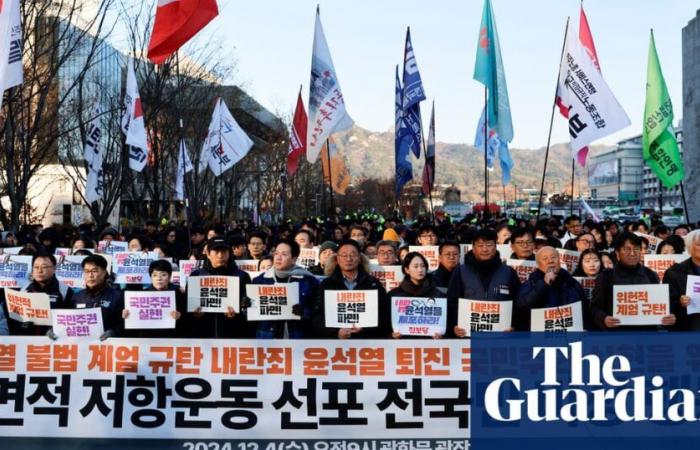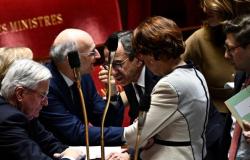South Korean opposition parties said they had submitted a motion to impeach the president, Yoon Suk Yeol, over his short-lived declaration of martial law.
“We’ve submitted an impeachment motion prepared urgently,” representatives for six opposition parties including the main Democratic party said on Wednesday, adding they would discuss when to put it to a vote, but it could come as soon as Friday.
Earlier on Wednesday, Yoon faced calls to quit immediately or face impeachment after an attempt to bring in martial law triggered protests and political condemnation. The liberal opposition Democratic party, which holds a majority in the 300-seat parliament, said its lawmakers had decided to call on Yoon to stand down straight away or they would take steps to impeach him.
“President Yoon Suk Yeol’s martial law declaration was a clear violation of the constitution. It didn’t abide by any requirements to declare it,” the Democratic party said in a statement. “His martial law declaration was originally invalid and a grave violation of the constitution. It was a grave act of rebellion and provides perfect grounds for his impeachment.”
Yoon’s shock bid to impose South Korea’s first state of martial law in over four decades plunged the country into the deepest turmoil in its modern democratic history and caught its close allies around the world off guard.
The US – which stations nearly 30,000 troops in South Korea to protect it from the nuclear-armed North – voiced deep concern at the declaration, then relief that martial law was over. Pentagon spokesperson Maj Gen Patrick Ryder told a news briefing that he did not believe the martial law declaration had any significant impact so far on US troops, some of whom work in combined commands with the South Korean military.
The US indefinitely postponed meetings of the nuclear consultative group (NCG) and related tabletop military exercises, a US official said, speaking on condition of anonymity. The NCG is a signature Yoon effort aimed at having South Korea play a greater role in allied planning for potential nuclear war on the peninsula.
The martial law declaration also cast doubt on a possible visit next week by the US defence secretary, Lloyd Austin.
The dramatic developments have left the future of Yoon – a conservative politician and former star public prosecutor who was elected president in 2022 – in serious jeopardy.
South Korea’s main opposition party – whose lawmakers jumped fences and tussled with security forces so they could vote to overturn the law – earlier called Yoon’s move an attempted “insurrection”.
The nation’s largest umbrella labour union also called an “indefinite general strike” until Yoon resigned. Meanwhile, the leader of Yoon’s own ruling People Power party, Han Dong-hoon, described the attempt as “tragic” while calling for those involved to be held accountable.
Opposition parties together control 192 seats in the 300-seat parliament, so would need lawmakers from Yoon’s own party to join them to attain the required two-thirds majority in the legislature for impeachment.
If the national assembly votes to impeach Yoon, the decision must then be upheld by at least six out of nine judges in the constitutional court. If he is removed from office, Yoon would become only the second president of South Korea since it became a democracy to have met that fate.
The other was Park Geun-hye, who was removed in 2017. Ironically, Yoon, the then prosecutor general, led the corruption case that precipitated Park’s downfall.
Yoon backed down on martial law early on Wednesday after lawmakers voted to oppose the declaration, which he made on Tuesday night citing the threat of North Korea and “anti-state forces”.
“Just a moment ago, there was a demand from the national assembly to lift the state of emergency, and we have withdrawn the military that was deployed for martial law operations,” Yoon said in a televised address about 4.30am.
“We will accept the national assembly’s request and lift the martial law through the cabinet meeting.”
Yonhap news agency then reported that Yoon’s cabinet had approved the motion to lift the order.
The U-turn prompted jubilation among protesters outside parliament who had braved freezing temperatures to keep vigil through the night in defiance of Yoon’s martial law order. Demonstrators who had been waving South Korean flags and chanting “Arrest Yoon Suk Yeol” outside the national assembly erupted in cheers.
Lim Myeong-pan, 55, told Agence France-Presse that Yoon’s decision to rescind martial law did not absolve him of possible wrongdoing. “He has paved his own path to impeachment with this,” he said.
On the streets of Seoul there was bafflement, while newspapers across the political spectrum published scathing editorials about Yoon’s actions.
The conservative and influential Chosun Ilbo published a searing editorial that said Yoon’s martial law declaration “severely crossed the line” of acceptable political bounds, and demanded accountability. The editorial said legal requirements were not met and called it a “national embarrassment” for a top 10 democracy.
Meanwhile, the left-leaning Hankyoreh’s editorial framed Yoon’s martial law declaration as a “betrayal of the people”, expressing disbelief that 21st-century Korea could see an elected president use the same justification (“anti-state forces plotting insurrection”) as the military junta did 45 years ago. It said that Yoon had “lost the minimum judgment and rationality required of a head of state”.
Yoon had given a range of reasons for declaring martial law – South Korea’s first in more than 40 years.
“To safeguard a liberal South Korea from the threats posed by North Korea’s communist forces and to eliminate anti-state elements plundering people’s freedom and happiness, I hereby declare emergency martial law,” Yoon said in a televised address.
Yoon did not give details of the North’s threats, but the South remains technically at war with nuclear-armed Pyongyang.
“Our national assembly has become a haven for criminals, a den of legislative dictatorship that seeks to paralyse the judicial and administrative systems and overturn our liberal democratic order,” Yoon said.
The president labelled the main opposition Democratic party, which holds a majority in parliament, “anti-state forces intent on overthrowing the regime”.
Yoon and his People Power party are also bitterly at odds with the opposition over next year’s budget. Opposition MPs last week approved a significantly downsized budget plan through a parliamentary committee.
The imposition of emergency martial law came after Yoon’s approval rating dropped to 19% in the latest Gallup poll last week, with many expressing dissatisfaction over his handling of the economy and controversies involving his wife, Kim Keon Hee.
South Korea is a major democratic ally for the US in Asia, but Washington said it was not given advance notice of Yoon’s plan to impose martial law.
“We are relieved President Yoon has reversed course on his concerning declaration of martial law and respected the ROK national assembly’s vote to end it,” a US national security council spokesperson said in a statement, using the acronym for South Korea’s official name.
China, a key ally of North Korea, had urged its nationals in the South to stay calm and exercise caution, while Britain said it was “closely monitoring developments”.
The UK Foreign Office’s minister for the Indo-Pacific, Catherine West, issued a statement, calling for “a peaceful resolution to the situation, in accordance with the law and the constitution of the Republic of Korea”.
The Japanese prime minister, Shigeru Ishiba, said: “We are monitoring [the South Korea situation] with particular and grave interest.” A lawmaker group on Korean affairs, led by Japan’s former PM Yoshihide Suga, cancelled a Seoul visit slated for mid-December, multiple Japanese outlets reported.
The Swedish prime minister, Ulf Kristersson, who was due to hold a summit with Yoon this week, had postponed it “given the recent developments”, his spokesperson said on Wednesday.
Vladimir Tikhonov, professor of Korea studies at the University of Oslo, said Yoon’s move to impose martial law was “an attempt to wind history back”. “I don’t think South Korea’s civil society can recognise Yoon as a legitimate president any longer,” he told AFP.
With Agence France-Presse






